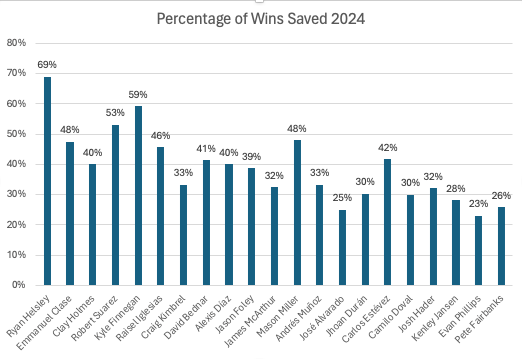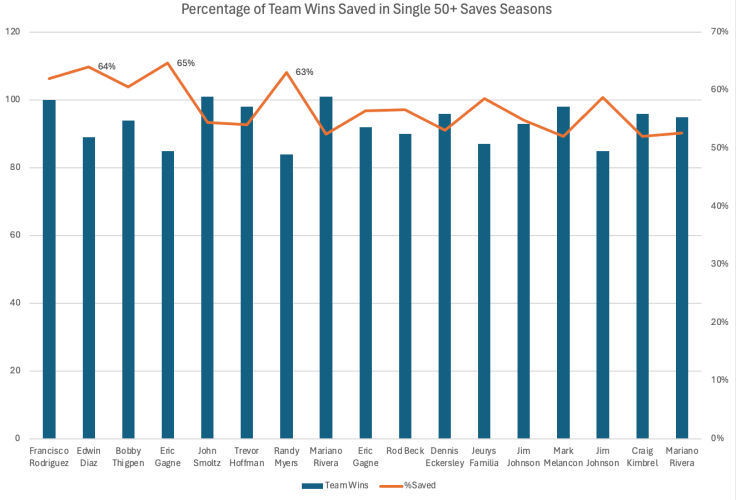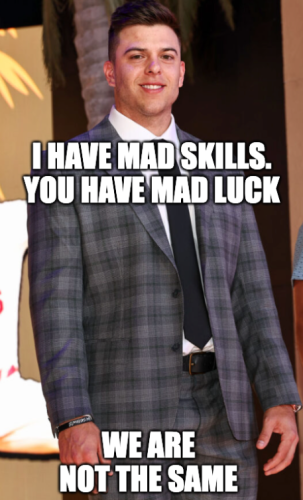This article is part of our Collette Calls series.
Ryan Helsley was the 12th closer off the board by ADP at the peak of draft season, but he is tops on the saves leaderboard as play begins on June 7 with 20 saves. He is one save ahead of the perennial workhorse Emmanuel Clase and is one of 16 relievers with at least 10 saves on the season. It's also worth mentioning that 5 of the 11 closers drafted ahead of him have yet to save their 10th contest. However, the saves total isn't even the craziest part of this story, as Helsley is doing something rather unprecedented so far this season.
The St. Louis Cardinals are 29-32, and conventional wisdom would tell you that it would be tough to garner saves on a team floating around .500, but Helsley continues to scoff at such traditional wisdom as he closes out the overwhelming majority of wins for the club. The chart below shows all closers with at least five saves in 2024 (ranked by number of saves) and the percentage of team wins that closer has protected:

The current high-water mark for saves on a team below .500 is held by Craig Kimbrel, who saved 47 of the 79 wins by Atlanta in the 2014 season, and that involved him closing out 59 percent of the team's wins. The high-water mark for saves in a season by a St. Louis reliever is held by Trevor Rosenthal (remember him?) with 48 saves in 2015, followed closely by the 47
Ryan Helsley was the 12th closer off the board by ADP at the peak of draft season, but he is tops on the saves leaderboard as play begins on June 7 with 20 saves. He is one save ahead of the perennial workhorse Emmanuel Clase and is one of 16 relievers with at least 10 saves on the season. It's also worth mentioning that 5 of the 11 closers drafted ahead of him have yet to save their 10th contest. However, the saves total isn't even the craziest part of this story, as Helsley is doing something rather unprecedented so far this season.
The St. Louis Cardinals are 29-32, and conventional wisdom would tell you that it would be tough to garner saves on a team floating around .500, but Helsley continues to scoff at such traditional wisdom as he closes out the overwhelming majority of wins for the club. The chart below shows all closers with at least five saves in 2024 (ranked by number of saves) and the percentage of team wins that closer has protected:

The current high-water mark for saves on a team below .500 is held by Craig Kimbrel, who saved 47 of the 79 wins by Atlanta in the 2014 season, and that involved him closing out 59 percent of the team's wins. The high-water mark for saves in a season by a St. Louis reliever is held by Trevor Rosenthal (remember him?) with 48 saves in 2015, followed closely by the 47 saves Lee Smith garnered in 1991 and the 47 saves Jason Isringhausen earned in 2004. In all three of those cases, the Cardinals were above .500, and none of those relievers were closing out games as frequently as Helsley has so far this season.
Helsley's efforts even top some of the more historic single-season saves totals of yesteryear. The chart below shows all closers with 50 or more saves in a single season and the percentage of their team's wins that the respective closer closed out:

Peak Eric Gagne has the best single-season percentage of team wins saved, as he earned a save in 55 of the Dodgers' 85 wins in the 2003 season. Edwin Diaz nearly bested that effort in 2018, as did Randy Myers all the way back in 1993, which ironically is the first season I played in a standard fantasy baseball league. The one thing all of these pitchers had in common was that their teams were above .500 by season's end; the lowest team win totals in the group were 84 and 85 wins for the aforementioned Gagne and Myers. Simply put, in the modern era, a closer's path to 50 saves is extremely contingent upon his team being an 88+ win team.
Helsley is now more than halfway to 40 saves, as he earned his 21st save of the season as I was in the midst of wrapping up this article. The Cardinals are 38.2 percent of the way through their regular season schedule and are 30-32 with 100 games left to play. Helsley's statistical profile justifies the performance, as he is embracing the closer-only role that he has long sought, working just one inning in each of his 28 appearances with fantastic results. He may not eclipse his fantasy success from 2022, when he saved 19 games and won nine contests while striking out 94 batters, but a 22.5% K-BB% and pristine ratios with supporting expected stats certainly offers comfort that Helsley could challenge 50 saves even if his club struggles to put together winning streaks.
Getting 40+ saves on a .500 team is not impossible, as we've seen it happen 33 times in baseball history, beginning with the late, great Dan Quisenberry in 1983 and most recently just last season when Emmanuel Clase saved 44 games for Cleveland. We haven't seen two pitchers do it in the same season since 2011, when Heath Bell and Drew Storen saved 43 games for the Padres and Nationals as both clubs finished below .500, but we could see it again this season, as Helsley isn't alone in his improbability.
The Washington Nationals are 28-35 and are highly unlikely to get to .500 by season's end, but that hasn't prevented Kyle Finnegan from grabbing saves as he has now successfully closed out 17 of the club's 28 wins. Finnegan has been in the closing mix for the club since 2021 and has usually been the line in the sand for fantasy managers for grabbing late saves, as so many have wishcasted Hunter Harvey taking that job. Finnegan has simply not allowed that to happen, and he's currently enjoying the best results of his career even if some of the underlying stats are incredibly concerning. Finnegan and Helsley are only in this conversation together because of their results to date, because the former has plenty of red flags to be concerned about moving forward:
| PITCHER | IP | K-BB% | HR/9 | HR/FB | WHIP | ERA | xERA | BA | xBA |
|---|---|---|---|---|---|---|---|---|---|
| Helsley | 28 | 22.5% | 0.64 | 7.4% | 1.04 | 2.25 | 2.01 | 0.219 | 0.193 |
| Finnegan | 25 | 15.5% | 1.44 | 23.5% | 0.92 | 1.80 | 4.52 | 0.149 | 0.256 |
In my attempt to emulate the Gus Fring meme, I present

The primary reason fantasy managers have considered Finnegan a fallback option rather than a target is his home run problem. That has persisted this season, even as the league as whole continues to struggle to hit home runs. Finnegan's 10.3 percent walk rate is its highest since the 2021 season, but his saving grace to date has been a .155 BABIP and a 92 percent left on base percentage. Conversely, Helsley has halved his problematic walk rate from last season, and his 5.4 percent rate this season is easily a career-best. His 76.3 percent left on base rate and .292 BABIP are well within league norms and even a bit below his established career levels. The skills, and not the fact that Helsley has a four-save lead on Finnegan, are why we should be looking at the former and not the latter as someone who could become the first closer to save 50 games for a sub-.500 club.
The other factor to consider here is both players are free agents after the 2025 season. The closer the Cardinals stay near .500, the less likely Helsley is traded anywhere. If a club wants full value on trading a closer, the best time to do so is the year before they're eligible for free agency, and not during the final months of their walk year. The Aroldis Chapman for Gleyber Torres deal in 2016 was an aberration and not the norm for walk-year deals. Should the Cardinals fall back into a malaise and dive further below .500, there is a risk Helsley is dealt to a contending team where the situation in the ninth is likely already settled. That risk is already looming large with Finnegan, as it would absolutely be in Washington's best interest to move the closer to another club while he's still getting results.
The expanded playoffs have reduced in-season trading, as many clubs tend to put off deals as long as possible in a perpetual game of chicken. St. Louis has played fewer games in their division than they have against the NL East or NL West so far, so they may see the schedule ahead as an opportunity to control their own destiny. The National League as a whole could be considered a wide-open market, with 11 of its 15 teams currently sporting losing records, which may give the Nationals some delusions of grandeur in the coming weeks. Their schedule has been the opposite of St. Louis, as they've played more divisional games (19) than they have games against the rest of the NL (15), with a majority of their schedule coming from interleague games (29).
In short, I don't see any reason not to continue riding Helsley much like we did with Clase last year, as the Cardinals have enough talent in a rather flat division and league to remain in the playoff picture through the trade deadline. The same cannot be said for Finnegan, as either his fortunes or his opportunities are likely to fail him in the coming weeks, so fantasy managers should act accordingly before the hot stove really heats up.










